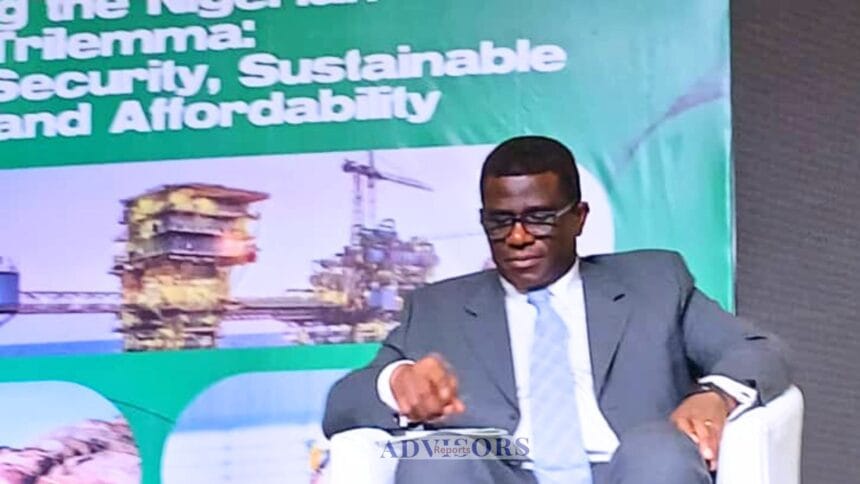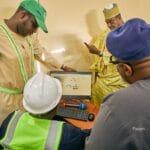“Feedstock shortage drives NLNG’s reliance on third-party suppliers” – Dr. Mshelbila, MD/CEO
Wilcox, NLNG’s Manager of Plant Integrity Assurance credits community partnerships for year-long success in preventing pipeline sabotage, efforts to secure assets
Oredola Adeola
Nigeria LNG has expressed optimism that the divestment of International Oil Companies from the onshore and shallow water fields to indigenous and independent firms could provide a crucial opportunity to secure feedstock gas supplies, which currently contribute to only 60% of its production capacity.
Advisors Reports gathered that the feedstock shortage has prompted the company’s reliance on third-party suppliers to sustain operations.
Dr. Philip Mshelbila, Managing Director/Chief Executive Officer of Nigeria LNG Limited made this submission at the ongoing 42nd NAPE Annual International Conference & Exhibition held in Lagos while speaking on the theme: Management session: Changing Dynamics in Nigeria’s Integrated Energy Sector: Impact on Sustainable Production and National Growth.
The MD, represented by Henry Wilcox, Manager of Plant Integrity Assurance at NLNG, at the event, stated that the company’s 22-million-tonne-per-annum plant in Bonny Island, alongside the ongoing construction of Train 7 to expand capacity to 30 million tonnes per annum, positions NLNG to play a pivotal role in supporting Nigeria’s energy transition agenda.
However, he stressed that the primary constraint facing the company remains gas supply.
“Note that, in each of the trains we’ve built, we secured commitments from our gas suppliers regarding their future investments and delivery. Yet, we continue to experience delays in gas delivery.”
“I think the current divestment environment can be a great opportunity to address this issue.
“Initially, we were supplied by our shareholders—Shell, ENI, and Total—but now we’ve shifted focus to third-party gas suppliers.
“We’ve recently signed agreements with ExxonMobil and are actively engaging with other third-party suppliers to diversify our gas sources.”
“We’re also relying on IOCs now operating in the deepwater, independents, and other indigenous companies in the upstream sector to exploit the country’s natural gas reserves, to evacuate more gas to our plants.”
Dr. Mshelbila further explained that the divestment presents an opportunity for increased local participation and ownership, which can drive economic empowerment, job creation, and the development of local expertise.
He said, “However, independent operators acquiring the assets are hindered by financial constraints and limited access to advanced technology.
“To address these challenges, strategic initiatives such as partnerships, mergers, and portfolio optimizations are essential to capture the remaining hydrocarbon value. Commitment to best practices in corporate governance and transparency will also ensure sustainability.
Regarding the ongoing Train 7, the MD noted, “The gas supply for this project is linked to some deepwater projects by the IOCs. However, many of them have not yet made their Final Investment Decisions, which contributes to the supply challenges.”
“Train 8, currently under development, is focused on sustainability. It will be a highly decarbonized facility,” he stated.
The NLNG’s MD acknowledged that beyond securing a stable gas supply, Nigeria LNG faces other challenges including infrastructure limitations, regulatory uncertainties, and security concerns in the Niger Delta, all of which continue to create bottlenecks and limit access to gas for both domestic and industrial use.
“Addressing these issues requires collaborative efforts between government, private sector stakeholders, and global partners.
“By investing in a resilient gas supply chain—through pipeline network expansion, security measures, and a transparent regulatory framework—Nigeria can unlock the full potential of its gas resources, meeting domestic energy needs while contributing to climate goals,” he said.
Speaking further, Dr. Mshelbila said, “This is an industry that Nigeria relies on significantly for economic growth.
“To ensure sustainable production and, crucially, the growth of the nation, we need to focus on expansion during this critical period.
“With global economic and political dynamics shifting, and the need to meet domestic demands, the development of our oil and gas sector is more important than ever.
“Nigeria has approximately 37 billion barrels of proven oil reserves, ranking as the second largest in Africa and tenth globally.
“We’re also abundantly endowed with over 200 trillion cubic feet of natural gas, making us the world’s ninth-largest reserve holder.
“This immense potential must be transformed into opportunities for our people, as population growth and economic development will drive energy demand in the coming decade.
“As the world transitions to net-zero emissions by 2050, there is a shift toward cleaner energy sources, led by environmental concerns and the imperative to reduce greenhouse gas emissions.
“LNG, as a transition fuel, can play a vital role in helping the world move toward a cleaner, more sustainable energy landscape.”
“This growing interest in LNG, both in Africa and globally, places Nigeria LNG (NLNG) in a strategic position, ” the MD/CEO noted.
Dr.Mshelbila also mentioned that the adoption of digital technologies is another advancement that can enhance operational efficiency and reduce the cost of producing gas in Nigeria.
He said, “The changing dynamics in Nigeria’s integrated energy sector present unique opportunities and challenges.
“By leveraging technological advancements, fostering local participation, and implementing strategic initiatives, we can ensure sustainable growth in gas supply and energy businesses.
“Together, we can navigate the evolving landscape and contribute to a cleaner, more sustainable energy future for Nigeria.
Speaking on the efforts the company has put in place to address community challenges within its operational area, Wilcox, Manager of Plant Integrity Assurance at NLNG, during the panel session stated that the company has been committed to involving host communities at every stage of its projects.
“We prioritize their perspectives, engaging them early in the project conception stages, granting them opportunities to recommend solutions and assess the potential impacts of their engagement with us,” he said.
“Our gas transportation system, which spans thousands of kilometers of pipelines running through various communities, has not encountered any disruptions or sabotage in over a year since we entered into agreements with the communities.”
He continued, “We have signed Gas Management Agreements (GMOs) with each community, incentivizing them to protect our assets, including pipelines and nodes, from vandalism.
“This is a robust and well-packaged incentive to secure these assets.”
“The safety of our infrastructure would be at risk without them. By maintaining close relationships with the communities, gathering their input, and regularly addressing their concerns, we’ve fostered a strong working relationship that helps prevent sabotage.
For the first time in years, we’ve had no incidents of sabotage on our gas assets,” the Manager of Plant Integrity Assurance at NLNG said.




